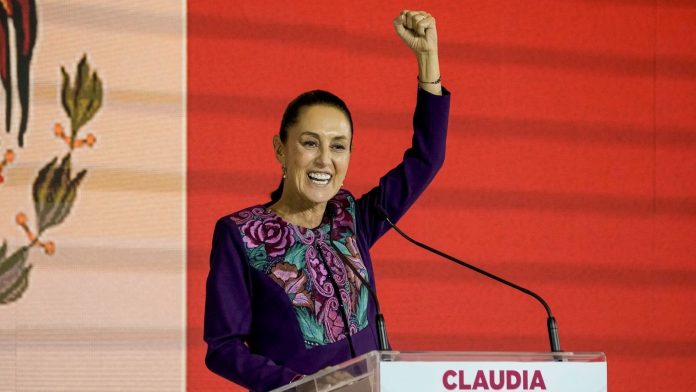Claudia Sheinbaum will be the first female president of the world's twelfth largest economy. There is no shortage of challenges. She will have to deal with drug cartels, migration and debt.
Left-wing politician Claudia Sheinbaum celebrated her clear victory in the presidential election in Mexico with fireworks and mariachi music. “In the 200-year history of our republic, I will be the first female president,” she said on Sunday evening (local time). Thousands of supporters of the government candidate gathered with Mexican flags on Zócalo Square in the heart of the capital Mexico City and chanted “President, President.”
She will work for everyone, but above all for the benefit of the poor, Sheinbaum announced. “I will lead Mexico on the path of peace, security, freedom and justice. I promise you, I will govern with humility and a sense of responsibility.” The 61-year-old former mayor of Mexico City received around 58 percent of the vote according to preliminary partial results, the electoral office announced. She will begin her six-year term on October 1.
Her two rivals from the opposition admitted defeat and congratulated Sheinbaum on her victory. Xóchitl Gálvez, candidate of the three largest opposition parties, came in second place with 28 percent according to the preliminary partial results. Jorge Álvarez from the smaller center-left party Movimiento Ciudadano received just over ten percent. The official final result is expected to be available from Wednesday. The ruling party Morena, to which Sheinbaum belongs, also did well in the parliamentary and regional elections, according to projections.
The governments of the Central American countries Guatemala, Honduras and Costa Rica congratulated Sheinbaum on her election victory. Congratulations also came from Germany. “We look forward to expanding relations in all areas and look forward to shaping this together with the new Mexican government,” said a spokesman for the Foreign Office.
“With all my affection and respect, I congratulate Claudia Sheinbaum,” said her political mentor, the incumbent left-wing populist head of state Andrés Manuel López Obrador, in a video message.
Sheinbaum plans to continue López Obrador's policies. However, she speaks of “continuity with her own signature.” Despite the unbridled violence of the drug cartels, López Obrador enjoys high approval ratings. However, after six years in office, he was not allowed to run again.
Sheinbaum wants to maintain and expand López Obrador's social policy with state aid for young and old people. In the fight against serious drug-related crime, she wants to continue to give the armed forces the command, but set new priorities. In the energy sector, unlike López Obrador, she wants to promote electricity generation from renewable energies.
It was the biggest election day in the history of Latin America's second-largest economy with 130 million inhabitants. More than 20,000 positions were filled. In addition to the presidency, all 500 seats in the House of Representatives and the 128 seats in the Senate were up for vote.
In addition, Mexicans voted for the governorships in eight of the 31 states and the capital district. Almost 100 million citizens were eligible to vote. According to initial forecasts, the ruling party Morena was able to retain the important capital district, among other things. The election campaign was overshadowed by violence: According to the consulting firm Integralia, at least 34 candidates have been killed since September.
In contrast to the charismatic López Obrador, the future president is considered a technocrat. López Obrador appointed her to the capital's cabinet as Minister of the Environment in 2000 when he was elected head of government of Mexico City. Sheinbaum later became mayor of a capital district and head of government of the capital from December 2018. She resigned from office to run for president.
Sheinbaum studied physics and has a doctorate in energy engineering. She contributed to two assessment reports of the Intergovernmental Panel on Climate Change (IPCC), which received the Nobel Peace Prize in 2007 for its efforts to combat climate change. Her parents were both left-wing scientists of Jewish descent with roots in Lithuania and Bulgaria, but she does not profess any religion.
The challenges facing the future president include the violence of the drug cartels, the high level of debt of the state-owned oil company Pemex and relations with the USA on issues of migration, drugs and trade. According to the government, poverty has declined in recent years thanks to a number of social programs and an increase in the minimum wage. However, more than a third of the population is still considered poor.
Mexico is the twelfth largest economy in the world. Numerous foreign companies produce their goods in Mexico in order to export them to the US market largely duty-free. The country's economic development is positive despite the poor security situation.



